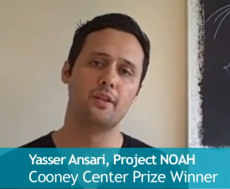 One of the perks of working with The Cooney Center and Sesame Workshop is getting to meet people doing amazing things. The industry is full of passionate organizations and individuals that are using digital media to promote children’s healthy development and learning in a multitude of ways I never would have dreamed of. As part of my blog series, I hope to occasionally spotlight these organizations — groups that are doing something different, something amazing, or something inspiring. It wasn’t difficult to decide where to shine my first spotlight — on an organization called HopeLab that is doing all three.
One of the perks of working with The Cooney Center and Sesame Workshop is getting to meet people doing amazing things. The industry is full of passionate organizations and individuals that are using digital media to promote children’s healthy development and learning in a multitude of ways I never would have dreamed of. As part of my blog series, I hope to occasionally spotlight these organizations — groups that are doing something different, something amazing, or something inspiring. It wasn’t difficult to decide where to shine my first spotlight — on an organization called HopeLab that is doing all three.
HopeLab is a California-based nonprofit that develops innovative technology-based solutions to help young people with chronic illness. Probably best known for Re-Mission, a video game for teens and young adults with cancer, the vision stemmed from founder Pam Omidyar’s days working in an immunology lab. At the end of long days spent watching cancer cells multiply, she unwound by playing video games with her husband, eBay founder Pierre Omidyar. Pam began to wonder if giving young cancer patients a chance to blast their malignant cells in a video game might actually improve their health. In 2001, Pam founded HopeLab and started to develop Re-mission to test this concept.
In Re-Mission, players travel through bodies of fictional cancer patients destroying cancer cells, battling bacterial infections, and managing side effects associated with their illness and treatment:
“An epic battle rages deep in the realms of the human body. Colonies of microscopic cancer cells replicate, attack and damage healthy organs. Enter Roxxi, your gutsy and fully armed nanobot, and medicine’s mightiest warrior. Lead her through challenging missions and rapid fire assaults on malignant cells, wherever they hide. It’s the world’s smallest battlefield, yet the stakes have never been higher.”
As with all of their work, HopeLab used scientific research methodologies to evaluate the efficacy of Re-mission, and found it to be an effective tool for young cancer patients. As of April 2009, more than 142,000 copies of Re-Mission had been distributed to 81 countries worldwide, and Re-Mission is still being distributed free of charge to young patients and their families.
In the decade since it was founded, HopeLab has developed a number of other innovative solutions. When it came time to tackle their second major health objective, childhood obesity, they tapped into the power of the crowd to help come up with a new approach to this serious social issue. HopeLab’s Ruckus Nation idea competition launched in the fall of 2007, challenging entrants to imagine a new product that would be fun enough to get kids up and moving. Over $300,000 in cash prizes was awarded to contestants who ranged in age from 6 to 82 years old, and ideas from the competition informed development of HopeLab’s latest product, Zamzee.
Zamzee is an online program that rewards teens for their physical activity. Merging the virtual and real words, participants wear a physical meter that records their physical activity, which in-turn powers their online account. Teens who use Zamzee earn recognition, the opportunity to take part in a range of online activities, and the ability to acquire things they want based on how much they move in the real world. Research shows that the program encouraged teens to move around 30% more — the equivalent of running one extra marathon a month.
Not only has HopeLab developed innovative products that are positively impacting the lives of children who need it most, but they have proven that specially designed technology can be both fun and effective in driving positive health behavior in young people. Thanks to a wonderful organization for giving us not only the hope but the motivation to develop innovative products that are rigorously researched, ultimately making an impact with our work.



